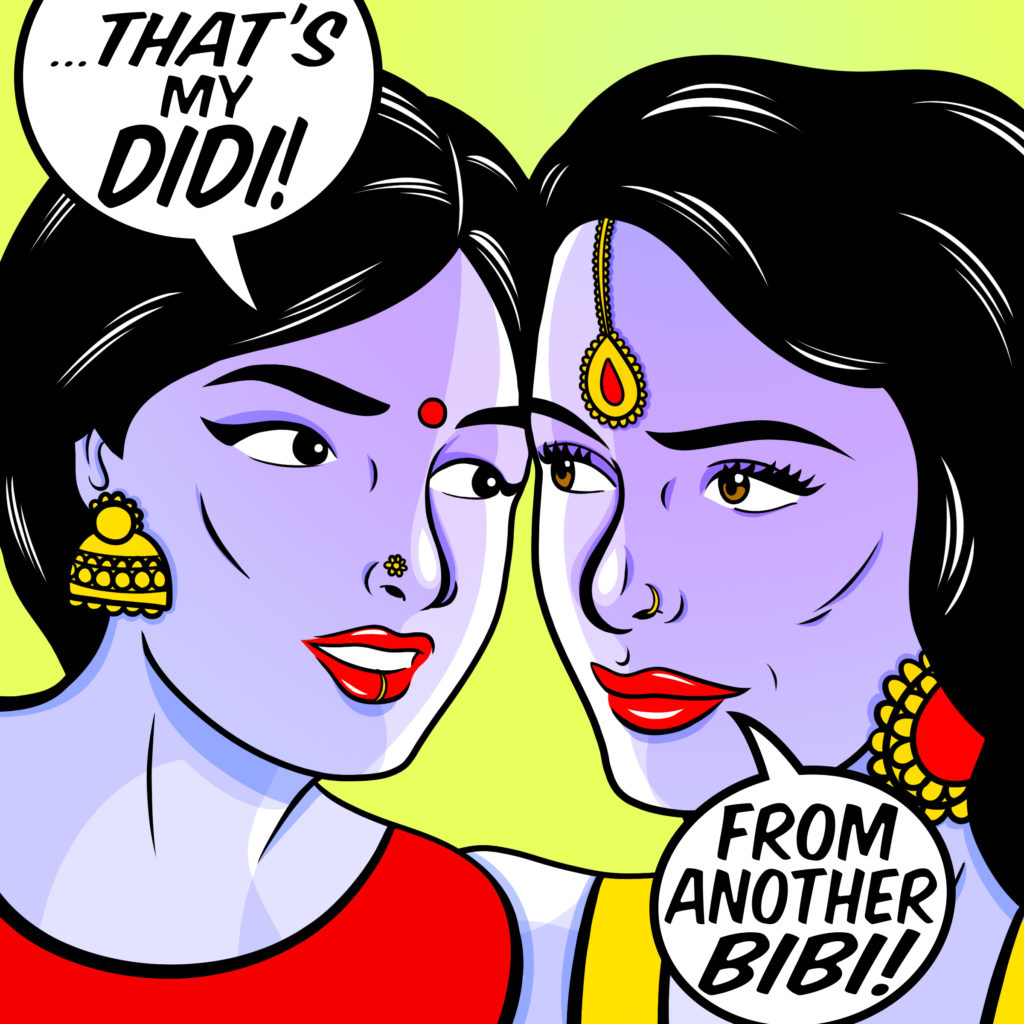
Last summer I walked into the Richard Taittinger Gallery, a cozy little nook in the East Village, excited to see Maria Qamar’s cartoon characters come to life. Qamar is an artist and author of Trust No Aunty, a book I was gifted last year and instantly fell in love with. Trust No Aunty is a humorous “survival guide” for South Asian youth in which Qamar speaks about her experience as a South Asian immigrant. Qamar was born in Karachi, Pakistan to a father from Bangladesh and a mother from Gujarat, India. Her multicultural identity inspired her to start sharing her comic-strip-type illustrations on an Instagram account (@hatecopy) where she gained a fanbase of desi girls all over the world.
Qamar named her summer show FRAAAANDSHIP! to highlight how the use of the term “on social media and communication platforms such as Instagram, Whatsapp, and Facebook, takes on a sexual, and potentially shady connotation.” Often times, the offers of “fraaaandship” come totally unsolicited and are sent by older men in the desi community. Looking around the gallery, I could see how Qamar visualized this concept through her artwork.
The Richard Taittinger Gallery is a confined space with white walls acting as blank canvases, making Qamar’s art even more striking and vibrant. It looked like she had ripped out pages from Trust No Aunty and blew them up as murals that covered an eight foot wall. One of my favorite installations was an image (attached) of two desi girls saying the phrase, “That’s my didi from another bibi,” which translates to, “That’s my sister from another aunty.” Having visited the gallery with one of my close friends, who is also South Asian, I smiled at this particular picture and felt grateful for her company.
Oftentimes in South Asian culture, there are certain ideals that females are meant to uphold. Qamar does well to incorporate these subliminal messages into her artwork, showing how they can be sexist, misogynist, and downright rude. She illustrates how South Asian women (and women in general) are told to exist within the boundaries that have already been drawn for them.
Something I have heard from multiple adults throughout my childhood was, “be friendly, but too friendly.” In other words, be careful of your company and be sure to keep your relationships strictly “surface-level.” While this piece of advice may come with good intentions, I have seen it morph into issues of secrecy, mistrust, and gossip. This kind of unhealthy mindset breeds toxicity among South Asian females, an issue that Qamar illustrates through her own work.
The American progressive magazine, In These Times, elaborates on the history of gossip: “It is a circulation of information not intended for the public ear but capable of ruining people’s reputations, and it is unequivocally ‘women’s talk.’ Gossip is an integral part of the devaluation of women’s personality and work.”
Clearly, these issues of gossip and ‘fraaaandship’ are inextricably linked to conversations surrounding female behavior, actions, and attitude. They are used to divide South Asian women and break our solidarity. What Qamar has done is create a space for South Asian females to unite despite this harmful rhetoric and remind us that genuine friendships do exist and thrive.
In an interview for Flare, a Canadian fashion magazine, Qamar addresses South Asian fans directly: “Trust No Aunty is a conversation between us, and everybody else that’s interested is simply leaning in and overhearing the conversation.”
-Teresa Mettela
Junior Girl
Girl Museum Inc.
